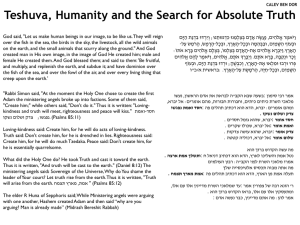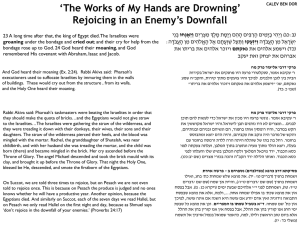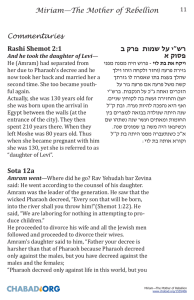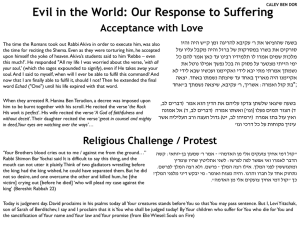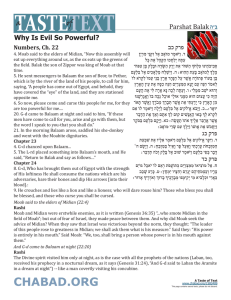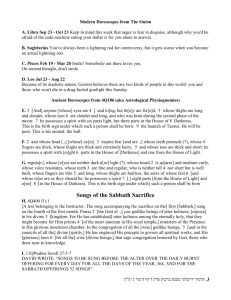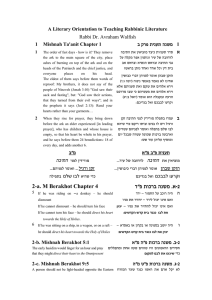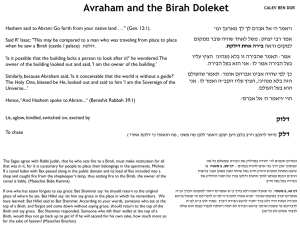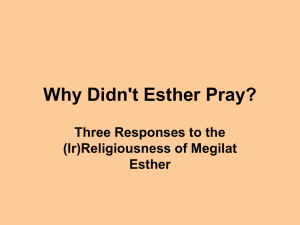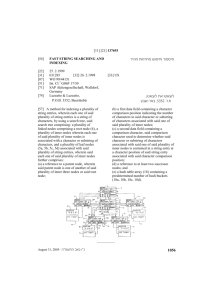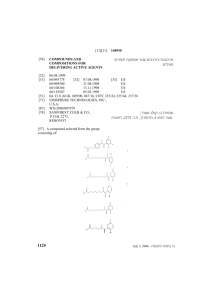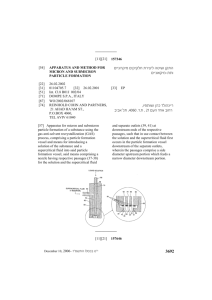Slides - Rabbinics Resources Online
advertisement
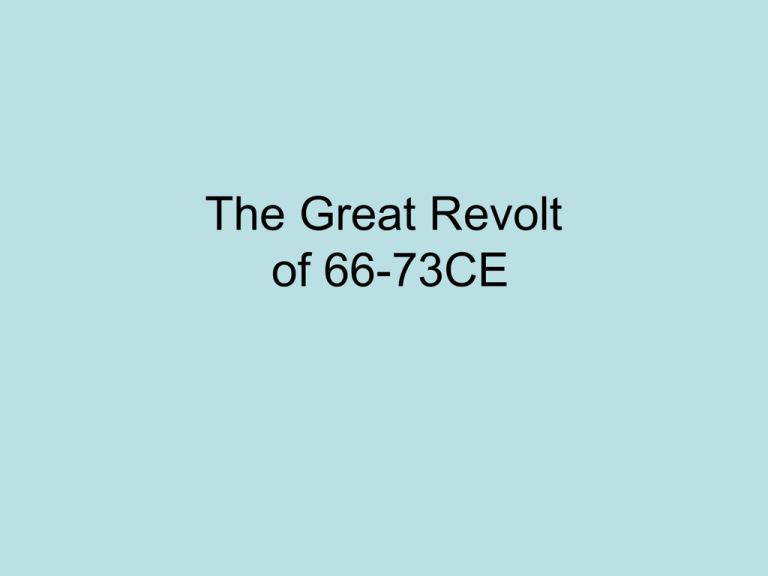
The Great Revolt of 66-73CE Our primary primary source •Josephus writes a whole book chronicling this war. •He is a general in the war and a first hand witness. •He called it “Bellum Judaicum.” •Based on the title alone, who is his audience? Josephus, War, 1.1 Josephus describes this war as “not only the greatest war of our own time but one of the greatest of all recorded wars.” The Enemy of my Enemy is still my Enemy •It was, in part, a civil war. •Roman rule did not threaten Jewish religion. Pharisaic and Sadducean leaders did not support the war and the High Priest led the peace-party. •Fanatics wanted a theocracy under the High Priest without Roman rule. Their bumper stickers said: “No master but God.” Life of Bwian Monty Python’s “Life of Brian” includes a parody of the internal Jewish political rivalry in the first decades of the first millenium. What have the Romans ever done for us? http://www.youtube.com/watch?v=ExWfh6s Gyso&feature=related Also PFJ Bavli Shabbat 33b R. Judah, R. Jose, and R. Simeon were sitting, and Judah, a son of proselytes, was sitting near them. R. Judah commenced [the discussion] by observing, ‘How fine are the works of this people! They have made streets, they have built bridges, they have erected baths.’ R. Jose was silent. R. Simeon b. Yohai answered and said, ‘All that they made they made for themselves; they built market-places, to set harlots in them; baths, to rejuvenate themselves; bridges, to levy tolls for them.’ Now, Judah the son of proselytes went and related their talk, which reached the government. They decreed: Judah, who exalted [us], shall be exalted, Jose, who was silent, shall be exiled to Sepphoris; Simeon, who censured, let him be executed. Causes of Agitation •Messianism – there was a prophecy widely believed in the Eastern part of the empire that a world-ruler would arise in Palestine at around this time. •Political extremists calling for national independence. Remembering the Maccabees. •Social factors - some called for economic reform for the poor. How Florus Inspired the Revolt Gessius Florus was the Roman procurator of Judea from 64 until 66. Florus was appointed by the Emperor Nero due to his wife's friendship with Nero's wife. He was noted for his public greed and injustice to the Jewish population, and is credited by Josephus as being the primary cause of the Great Jewish Revolt. Upon taking office in Caesarea, Florus began a practice of favoring the local Greek population of the city over the Jewish population. The local Greek population noticed Florus' policies and took advantage of the circumstances to denigrate the local Jewish population. One notable instance of provocation occurred while the Jews were worshiping at their local synagogue and a Hellenist sacrificed several birds on top of an earthenware container at the entrance of the synagogue, an act that rendered the building ritually unclean. In response to this action, the Jews sent a group of men to petition Florus for redress. Despite accepting a payment of eight talents to hear the case, Florus refused to listen to the complaints and instead had the petitioners imprisoned. Florus further angered the Jewish population of his province by having seventeen talents removed from the treasury of the Temple in Jerusalem, claiming the money was for the Emperor. In response to this action, the city fell into unrest and some of the Jewish population began to openly mock Florus by passing a basket around to collect money as if Florus was poor. Florus reacted to the unrest by sending soldiers into Jerusalem the next day to raid the city and arrest a number of the city leaders. The arrested individuals were whipped and crucified despite many of them being Roman citizens. See Josephus, Wars, 2.14.5-9 Babylonian Talmud Gittin 56a-b: The Rabbinic Account of the Siege [Bar Kamza] went and said to Caesar, “The Jews have rebelled against you.” [Caesar] said to him, “How can I tell?” [Bar Kamza] said to him, “Send a sacrifice to them and see whether they offer it.” [Caesar] sent a young calf with [Bar Kamza]. While on the way, [Bar Kamza] made a blemish on its upper lip, or as some say, on the white of its eye, in a place which is considered a blemish to [the Jews], but not to [the Romans]. The Rabbis considered sacrificing it for political peace, (but) Rabbi Zechariah ben Abkulas said, “They will say that blemished animals may be slaughtered on the altar.” They considered killing [Bar Kamza] so that he not go and inform, (but) Rabbi Zechariah said to them, “They will say that one who blemishes a consecrated animal shall be killed.” Rabbi Yohanan said, “The meekness of Rabbi Zechariah ben Abkulas destroyed our House, burned our Temple, and exiled us from our Land.” Josephus, War II, 405-48: The First Stage of the Revolt (409) At the same time, Eleazar, the son of Ananias the high priest, a very bold youth who was at that time governor of the temple, persuaded those who officiated in the divine service to receive no gift or sacrifice from any foreigner. This was the true beginning of our war with the Romans for they rejected the sacrifice of Caesar on this account. (410) When many of the high priests and principal men besought them not to omit the sacrifice which it was customary for them to offer for their rulers, they would not be prevailed upon. They relied much upon their numbers, for the stalwarts of the revolutionaries assisted them, but they relied above all on the authority of Eleazar, the governor of the temple. (411) Then the men of power got together and conferred with the high priests, as did also the most notable of the Pharisees, and thinking that all was at stake and that their calamities were becoming incurable, they took counsel as to what was to be done. Accordingly, they determined to try an appeal to the revolutionaries…. (417) As they spoke, they produced those priests who were expert in the traditions of their country, who reported that all their forefathers had received sacrifices from foreign nations. But still not one of the revolutionaries would hearken to what was said: Indeed, those who ministered in the temple failed to come to their support but were preparing matters for beginning the war…. Josephus (War 4.225-226) names Zacharias the son of Amphicalleus, a priest, as one of the leaders of the Zealots. Bavli Gittin 56a-b: Burning Grain He sent Vespasian Caesar against them. He came and besieged [Jerusalem] for three years. There were three rich men there…. These men had enough to feed [Jerusalem] for twenty-one years. There were among them those rebels. The Rabbis said to them, “Let us go out and make peace with them [the Romans].” [The rebels] would not allow them. [The rebels] said to [the Rabbis], “Let us go out and make war against them.” The Rabbis said to them, “It will not succeed [for lack of divine support].” They [the rebels] arose and burned the provisions of wheat and barley, and there was famine. Josephus and Tacitus also report that there were vast quantities of grain in Jerusalem that were burned. Seforno (Breishit 33:4) asserts that had the Biryonim (Zealots) of the late Second Temple period followed the example of Yaakov Avinu, the second Beit HaMikdash would not have been destroyed (see Gittin 56a). Stages of War 66CE - Procurator Florus showed disrespect for Jewish religious sensibilities. Some priests decided to suspend the sacrifice on behalf of the emperor. 67CE – Emperor Nero sends general Vespasian who destroys Galilee. 68CE – Vespasian is recalled to become emperor. 69CE – Vespasian sends his son Titus 70CE – Destruction of Temple 73CE – Capture of Masada The Josephus Puzzle Where is the Menorah? Jewish War 7, 148-152- Titus’s Triumphal Return to Rome. The spoils in general were borne in promiscuous heaps; but conspicuous above all stood those captured in the temple at Jerusalem. These consisted of a golden table, many talents in weight, and a lampstand, likewise made of gold, but constructed on a different pattern than those which we use in ordinary life. Affixed to a pedestal was a central shaft, from which there extended slender branches, arranged trident-fashion, a wrought lamp being attached to the extremity of each branch, of these there were seven, indicating the honor paid to that number among the Jews. After these, and last of all the spoils, was carried a copy of the Jewish Law. They followed a large party carrying images of victory, all made of ivory and gold. Behind them drove Vespasian, followed by Titus; while Domitian rode beside them, in magnificent apparel and mounted on a steed that was in itself a sight. Jewish War 7, 158-162-- Titus’s Triumphal Return to Rome. The triumphal ceremonies being concluded and the empire of the Romans established on the firmest foundation, Vespasian decided to erect a temple of Peace. This was very speedily completed and in a style surpassing all human conception. For, besides having prodigious resources of wealth on which to draw he also embellished it with ancient masterpieces of painting and sculpture; indeed, into that shrine were accumulated and stored all objects for the sight of which men had once wandered over the whole world, eager to see them severally while they lay in various countries. Here, too, he laid up the vessels of gold from the temple of the Jews, on which he prided himself; but their Law and the purple hangings of the sanctuary he ordered to be deposited and kept in the palace. Sifre Zutta, Ba’alotekha to Numbers 8:2. …And whence do I know that each lamp was pointed toward the middle lamp? Scripture says: “toward the lampstand (menorah)” (Num. 8:2). And thus it says: “and he dwells turned toward me” (memuli, Numbers 22:5). Said Rabbi Simeon: When I went to Rome there I saw the menorah. All of the lamps were pointed toward the middle lamp. Surviving Trauma: How Judaism Reacts to National Tragedy משנה מסכת אבות פרק א משנה ב שמעון הצדיק היה משירי כנסת הגדולה הוא היה אומר על שלשה דברים העולם עומד על התורה ועל העבודה ועל גמילות חסדים: Simon the Just (c. 200BCE) said: Upon three things the world stands: upon Torah, upon the temple worship service, and upon deeds of kindness. משנה מסכת אבות פרק א משנה יח רבן שמעון בן גמליאל אומר על שלשה דברים העולם עומד על הדין ועל האמת ועל השלום שנאמר )זכריה ח( אמת ומשפט שלום שפטו בשעריכם: Rabbi Shimon ben Gamaliel said, Upon three things the world stands: upon justice, upon truth, and upon peace. תלמוד בבלי מסכת יומא דף ט עמוד ב מקדש שני ,שהיו עוסקין בתורה ובמצות וגמילות חסדים מפני מה חרב? מפני שהיתה בו שנאת חנם .ללמדך ששקולה שנאת חנם כנגד שלש עבירות: עבודה זרה ,גלוי עריות ,ושפיכות דמים. Rabban Yohanan ben Zakkai’s Enactments משנה מסכת ראש השנה פרק ד משנה א -יום טוב של ראש השנה שחל להיות בשבת במקדש היו תוקעים אבל לא במדינה משחרב בית המקדש התקין רבן יוחנן בן זכאי שיהו תוקעין בכל מקום שיש בו בית דין אמר רבי אלעזר לא התקין רבן יוחנן בן זכאי אלא ביבנה בלבד אמרו לו אחד יבנה ואחד כל מקום שיש בו בית דין: משנה ב -ועוד זאת היתה ירושלם יתירה על יבנה שכל עיר שהיא רואה ושומעת וקרובה ויכולה לבא תוקעין וביבנה לא היו תוקעין אלא בבית דין בלבד: משנה ג -בראשונה היה הלולב ניטל במקדש שבעה ובמדינה יום אחד משחרב בית המקדש התקין רבן יוחנן בן זכאי שיהא לולב ניטל במדינה שבעה זכר למקדש ושיהא יום הנף כולו אסור: משנה ד -בראשונה היו מקבלין עדות החדש כל היום פעם אחת נשתהו העדים מלבוא ונתקלקלו הלוים בשיר התקינו שלא יהו מקבלין אלא עד המנחה ואם באו עדים מן המנחה ולמעלה נוהגין אותו היום קדש ולמחר קדש משחרב בית המקדש התקין רבן יוחנן בן זכאי שיהו מקבלין עדות החדש כל היום אמר רבי יהושע בן קרחה ועוד זאת התקין רבן יוחנן בן זכאי שאפילו ראש בית דין בכל מקום שלא יהוא העדים הולכין אלא למקום הוועד: תלמוד בבלי מסכת ראש השנה דף כט עמוד ב משחרב בית המקדש התקין רבן יוחנן בן זכאי וכו'. תנו רבנן :פעם אחת חל ראש השנה להיות בשבת, ]והיו כל הערים מתכנסין[ .אמר להם רבן יוחנן בן זכאי לבני בתירה :נתקע - .אמרו לו :נדון - .אמר להם :נתקע ואחר כך נדון .לאחר שתקעו אמרו לו: נדון! -אמר להם :כבר נשמעה קרן ביבנה ,ואין משיבין לאחר מעשה. Rambam, Letter on Astrology This is why our kingdom was lost and our Temple was destroyed and why we were brought to this; for our fathers sinned and are no more because they found many books dealing with these themes of the star gazers, these things being the root of idolatry, as we have made clear in Laws Concerning Idolatry. They erred and were drawn after them, imagining them to be glorious science and to be of great utility. They did not busy themselves with the art of war or with the conquest of lands, but imagined that those studies would help them. Therefore the prophets called them "fools and dolts" (Jer. 4:22). And truly fools they were, "for they walked after confused things that do not profit" (I Sam. 12:21 and Jer. 2:8). Don’t Mourn Too Much Our Rabbis taught: When the Temple was destroyed for the second time, large numbers in Israel became ascetics, binding themselves neither to eat meat nor to drink wine. R. Yehoshua entered a conversation with them and said to them: My sons, why do you not eat meat nor drink wine? They replied: Shall we eat flesh which used to be brought as an offering on the altar, now that this altar is in abeyance? Shall we drink wine which used to be poured as a libation on the altar, but now no longer? He said to them: If that is so, we should not eat bread either, because the meal offerings have ceased. They said: [That is so, and] we can manage with fruit. We should not eat fruit either, [he said,] because there is no longer an offering of first fruits. Then we can manage with other fruits [they said]. But, [he said,] we should not drink water, because there is no longer any ceremony of the pouring of water. To this they could find no answer… It has been taught: R. Yishmael ben Elisha said: Since the day of the destruction of the Temple we should by rights bind ourselves not to eat meat nor drink wine, only we do not lay a hardship on the community unless the majority can endure it (Bava Batra 60b). God Suffers With Us Eicha Rabbah 1 "O that my head were waters, and my eyes a fountain of tears, that I might weep day and night for the slain of the daughter of my people!" (Jeremiah 8:23). Who spoke this verse? If they said that it was Jeremiah, it is impossible that he would neither eat nor drink nor sleep. Rather it was said by the Holy One, blessed be he, who never sleeps, as it is said (Ps 121:4), “He that watches Israel neither slumbers nor sleeps.” Reactions to the Destruction Practical Economic – buy back land Religious – build synagogues Holidays – Pesah and Sukkoth Psychological, mourning but not excessively Theological – because of our sins, שנאת חינם God Suffers With Us
